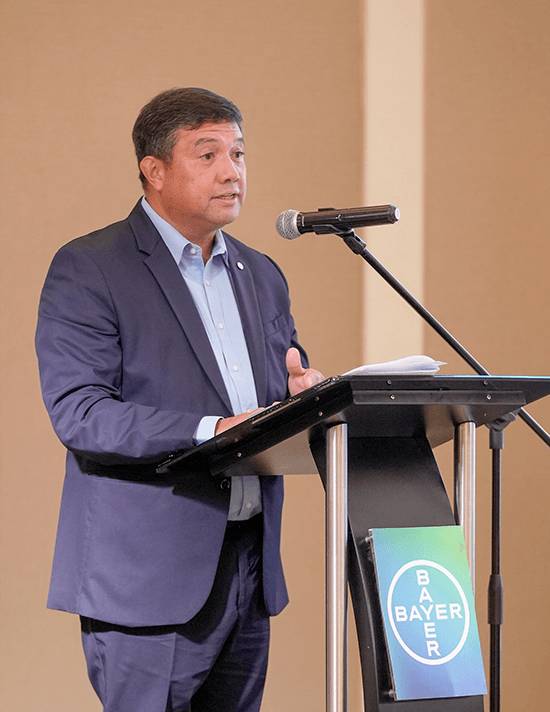Bayer empowers Filipino women to take charge of their reproductive health
Filipino women face many challenges when it comes to their reproductive health, due in part to prevalent gender biases that continue to impact their ability to open up and make informed decisions and choices about their bodies. To encourage discussion and action around women's health, Bayer Philippines Inc. launched “Bayer for Her: Conversations of Care” on Aug. 30 to break the ice around these often-taboo topics.
According to the United Nations Fund Population Philippines (UNFPA), gender biases exist in political, educational, economic, and bodily autonomy dimensions. In the Philippines, 92% of men and women hold fundamental biases against women in terms of bodily autonomy, which includes their reproductive rights. Although the number of women using family planning or contraceptive methods increased to eight million in 2020 from 7.6 million in 2019, there are still an estimated 44% of women who are unable to make decisions about their health.
While women have a higher risk of developing certain conditions such as menstruation-related diseases, vaginal infections, and chronic diseases like endometriosis, these health concerns are still considered taboo. This uncertainty sometimes leads to severe issues being dismissed as “normal” or “simply part of being a woman.”
Conversations of care at free pop-up clinics
The launch gathered medical experts and women’s health advocates who have experienced health issues and encouraged Filipino women to seek professional healthcare advice on their reproductive health concerns.
To help more women make informed choices about their bodies, Bayer for Her is opening an initial series of free pop-up consultation clinics over the next two months at selected partner drug stores to encourage more women to seek out expert advice on reproductive health.

These pop-up clinics aim to help create safe spaces for women to speak up and normalize conversations about their reproductive health concerns, address common misconceptions and the barriers to why they do not consult with their doctors, and get the support they need.
“With the launch of Bayer for Her: Conversations of Care, we continue to raise awareness on women’s health. We know from listening to health care providers and patients that it’s not easy to talk about contraception, period pain, and related topics in our cultural context. Bayer for Her enables these Conversations of Care with free pop-up clinics over the next two months at selected branches of our partners from Mercury Drug, Southstar Drug, Rose Pharmacy, and Watsons,” said Angel-Michael Evangelista, managing director and country division head of pharmaceuticals, Bayer Philippines.

Breaking barriers to women’s health
In the Philippines, one out of six women of reproductive age experience polycystic ovary syndrome or PCOS, which places them at risk of reduced quality of life due to psychological and behavioral disorders such as anxiety, depression, and eating disorders. Dermatologist Dr. Jarische Lao-Ang said that PCOS can manifest physically in women’s bodies through menstrual irregularity and infertility, and through androgen excess in the form of seborrhea, acne, hirsutism, and alopecia, and emphasized the importance of women telling their doctors what they truly feel to get the proper treatment options.
Former professional volleyball player and mom Melissa Gohing-Nacino shared that her diagnosis of PCOS emotionally affected her, especially when she and her husband were trying to get pregnant.
“Our OB-GYN really helped us throughout the process until we found the right treatment and medication to control the symptoms and help with my fertility,” she said.
Endometriosis, on the other hand, is a painful gynecological disease in which the lining of the uterus grows outside of it. Besides direct health impacts, endometriosis affects a woman’s social life, career, and livelihood, and it affects nearly 10% of reproductive-age women globally.
Dr. Margaret Cristi-Limson, who specializes in obstetrics, gynecology, and reproductive medicine, emphasized that endometriosis sometimes takes several years to be diagnosed through laparoscopy. However, medical breakthroughs now allow clinical diagnosis which encourages doctors to talk to their patients and start treatment even without surgery, adding that they should “trust their doctors.”
For Verniece Enciso, a vlogger who has endometriosis, the pain affected her daily routine and social activities. “I couldn’t stand the pain, so I finally talked to my doctor and got the diagnosis. He recommended available treatment options that suit me, and I’m glad I sought his professional advice from the get-go, or else I will still be enduring the pain until now,” she said.
Content creator and reproductive health advocate Say Tioco also stressed the importance of having a community where women can openly speak about their health concerns and use of contraceptive methods. “Women tend to be hesitant when it comes to talking about using contraception because of their fear of being misjudged due to the persisting myths and stigma,” she shared.
Championing Filipino women’s health
Bayer’s legacy in women’s health can be seen through initiatives that include working with different organizations to promote rights-based family planning and counseling, and appropriate reproductive health education.
Public webinars like Women’s Health Matters were set up to allow young women to consult healthcare professionals about their reproductive and sexual health concerns in a safe, judgment-free space. Bayer also created a chatbot, called Ask Mara, where women can openly ask anything about their reproductive concerns, from contraceptive options to their usage, the pros and cons of each method, and other related women’s health concerns.
Bayer is also helping raise awareness on contraception and family planning, alongside self-care and financial literacy in the countryside through its Bayer Kubo program, helping farmers’ wives and women in rural communities avoid risks attached to unplanned pregnancies. Since the launch last year with its partner, ASSIST Asia, Bayer has reached over 5,000 individuals at pilot sites in Manaoag, Pangasinan, and Dolores, Quezon.
* * *
Editor’s Note: This article was provided by Bayer .



